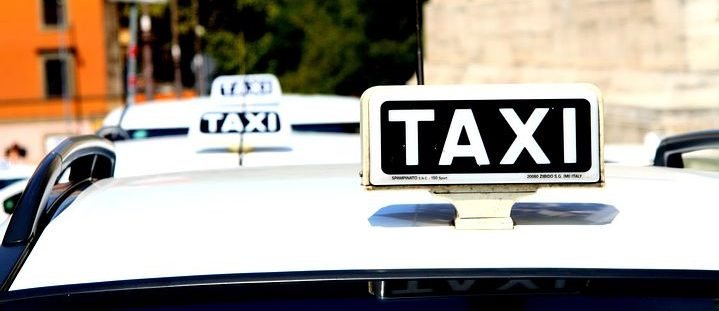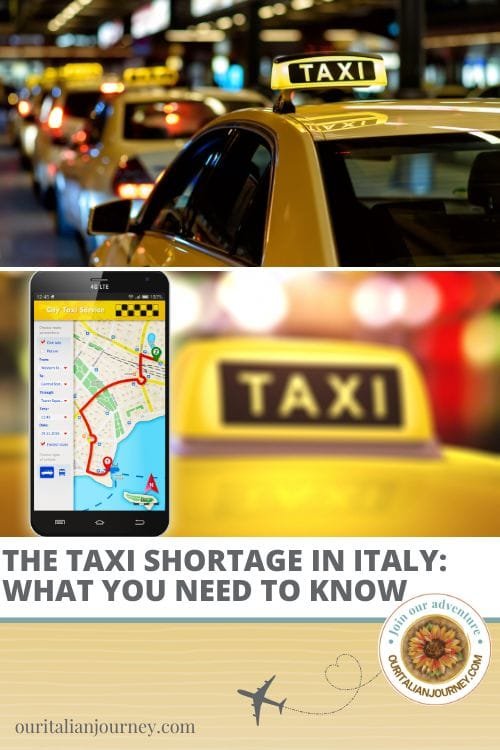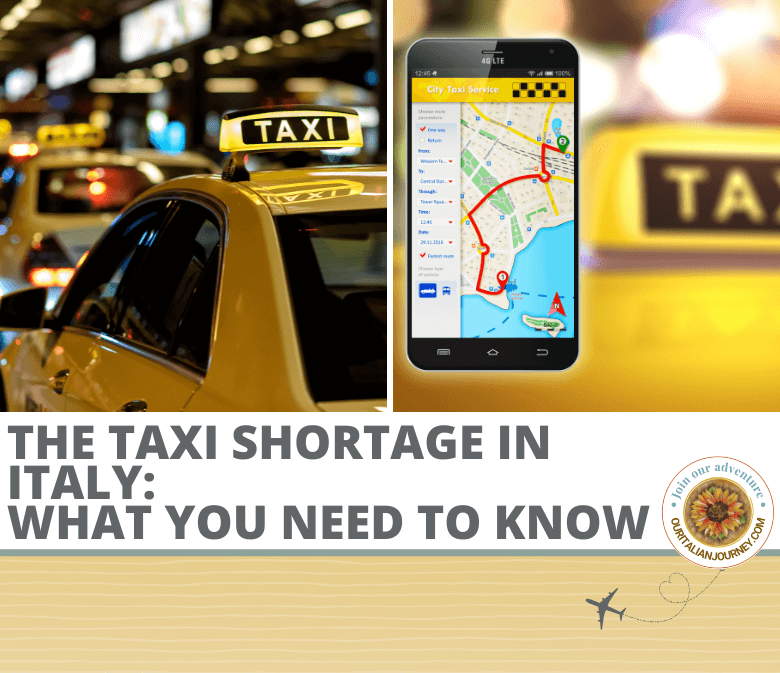Taxi Shortage in Italy
There’s such a thing—a taxi shortage in Italy? If there’s one thing that visitors and residents in Italy frequently complain about, it’s the difficulty of finding a taxi. Long queues, frustrating wait times, and the inability to hail a cab on the street like in the States make taxis one of Italy’s most challenging aspects of transportation. While this issue isn’t new, it remains a significant problem in 2025, especially in cities like Rome, Milan, and Naples.
This post contains affiliate links that help keep this website running. By purchasing through our links, we make a small commission at no extra charge to you. Thank you for your support!
Why is it so Hard to Get a Taxi in Italy?
Unlike in cities like New York or London, where you can flag down a cab from the curb, Italian taxis must be booked in advance, picked up at designated taxi stands, or called via phone or app. This system, combined with a severe lack of available taxis, creates long wait times and frustration, particularly at airports, train stations, and popular tourist spots.
The root of the problem? A shortage of taxi licenses. Many Italian cities have not issued new taxi licenses in years, some for decades. To put this in perspective, here are a few examples that I found:
- Naples (2,364 taxis for a population of nearly one million) has not issued new licenses since 1997.
- Genoa and Livorno have not been granted new taxi licenses since 1980 and 1977.
- Rome last issued new taxi licenses in 2004.
For context, Rome currently has 7,838 taxis (around 35 per 10,000 residents), while cities like London (106 taxis per 10,000 residents) and Paris (nearly 90 per 10,000 residents) have significantly more cabs available.

What’s Happening in 2025 to Fix the Problem?
As you would assume, progress is slow. From what I can gather, the Italian government and local authorities are finally addressing this issue. Here’s what’s happening now in two major cities:
- Rome- New Taxi Licenses: In September 2024, Rome issued 1,000 new taxi licenses—the first in 20 years—just in time for the anticipated crowds of the 2025 Jubilee Year.
- Milan- The city is adding 450 new taxi licenses to help meet demand, particularly for late-night and weekend travelers.
Despite these changes, in my opinion, these additions are not going to be enough. You really would need a whole lot more to make a real difference.
The Taxi Situation in Tuscany and Lucca
The taxi shortage isn’t just a problem in Italy’s largest cities—it also affects smaller regions, including Tuscany. Travelers visiting popular towns such as Florence, Siena, and Lucca often struggle to find taxis, especially in peak tourist seasons.
Tuscany struggles with taxi availability in rural areas, so travelers heading to smaller towns or vineyards should arrange private transfers in advance or consider renting a car.
One of our favorite and most reliable companies is The Tuscan Wanderer. We’ve written and highly recommended them in our book, “When Your Heart Finds Its Home.”
Our memoir of Italy is not merely a collection of travel experiences; it’s a journey into the depths of our souls. Italy’s beauty, history, and passion have left us forever enchanted. This country has taught us to slow down, savor life’s simple pleasures, cherish art and history, and embrace the connections we forge with people and places. Italy is not just a destination; it’s a state of mind that continues to inspire us.
🏆Awarded: Author Shout, Recommended Read 2024

What About Uber?
Italy doesn’t have Uber in the way many travelers are used to because of strict regulations protecting the country’s traditional taxi industry. Unlike in the US or other countries where Uber operates freely, Italian law heavily favors licensed taxi drivers, who must undergo extensive training, testing, and licensing to operate legally. Ride-sharing services like Uber have faced legal battles and protests from taxi unions, leading to restrictions. Uber operates in some Italian cities, but only through Uber Black, which uses licensed professional drivers rather than independent contractors. This means you won’t find budget-friendly UberX rides in Italy—only higher-end services with fares comparable to traditional taxis.
The Power of the Taxi Lobby
One of the main reasons taxi shortages persist is the strong influence of Italy’s taxi driver lobby. This group has successfully fought against issuing new licenses and opening the market to competition. Taxi drivers have staged mass protests and even resorted to aggressive tactics to block ride-sharing services and maintain their monopoly.
In fact, the taxi lobby’s political influence is so strong that some Italian commentators even refer to it as a “mafia.” In 2022, then-Prime Minister Mario Draghi attempted to open the market to competitors but was blocked by political parties that sided with taxi drivers.
What This Means for Travelers
Until these changes take full effect (if they ever do), travelers to Italy should be prepared for tax-related frustrations. Here are some tips to navigate the situation:
- Plan Ahead – If you need a taxi, book one in advance via phone, an official taxi app (such as Free Now, appTaxi, or itTaxi), or if staying in a hotel- use the concierge.
- Use Public Transport – Public transport is reliable and much cheaper than taxis in many cities.
- Consider Alternatives – Ride-sharing services are heavily restricted in Italy, but in some cities, private hire cars (NCCs) are an option (though they must be booked in advance and cannot pick up passengers on the street).
- Be Aware of Costs – Taxi fares have increased, so check official rates before your ride to avoid surprises.
In Conclusion… Taxi Shortage in Italy- Will Things Ever Improve?
While some progress is being made, it’s unlikely that Italy’s taxi shortage will be resolved anytime soon. The combination of strong political resistance, slow bureaucracy, and increasing demand means that, for now, visitors to Italy will still have to navigate a less-than-ideal taxi system.
So if you’re heading to Italy in 2025, be prepared: taxis may be scarce, wait times may be long, and your best bet is always to plan ahead!








